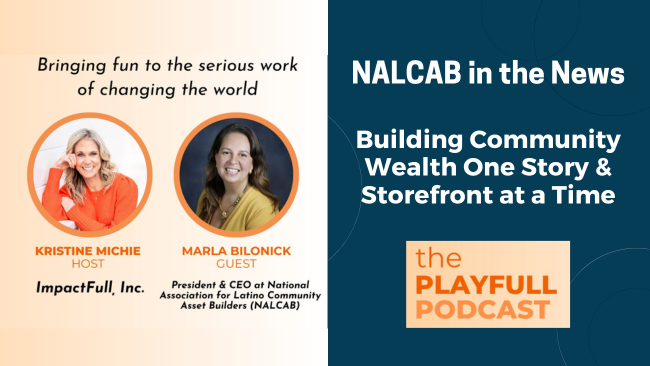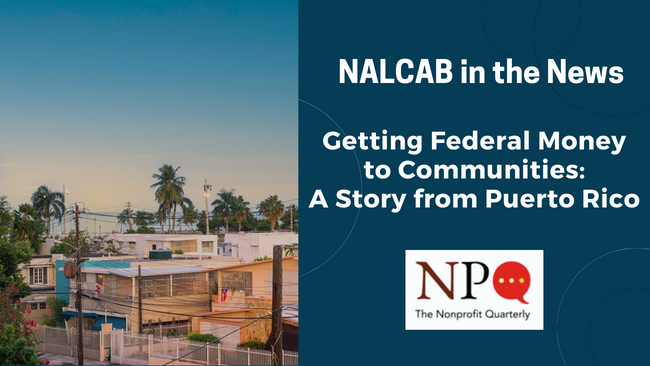
This week, in response to the Department of Housing and Urban Development’s (HUD) decision to delay implementation of the Affirmatively Furthering Fair Housing (AFFH) rule, NALCAB demanded answers and stressed the importance of this rule to our members and Latinos nationwide. Below you will find the text of our letter:
March 6, 2018
Ms. Krista Mills
Office of the Deputy Assistant Secretary for Policy, Legislative Initiatives, and Outreach
Department of Housing and Urban Development
451 7th Street SW, Room 5246
Washington, DC 20410
RE: Affirmatively Furthering Fair Housing: Extension of Deadline for Submission of Assessment of Fair Housing for Consolidated Plan Participants (Docket No. FR-5173-N-15)
Dear Ms. Mills,
On behalf of the National Association for Latino Community Asset Builders (NALCAB), we appreciate the opportunity to comment on the Department of Housing and Urban Development’s (HUD) deadline extension for Assessments of Fair Housing (AFH) under the Affirmatively Furthering Fair Housing (AFFH) rule.
NALCAB works to create economic opportunity for Latino families, communities and organizations. Our efforts support small business creation, affordable housing and homeownership opportunities, and financial education programs that build credit. Our mission is to support policies and practices that provide economic opportunity for low- and moderate-income people. Owning a home is the most important asset for many Latino families which is why promoting access to decent and affordable housing is a key element of our work.
Grounded in the Fair Housing Act of 1968, the AFFH rule mandates that local governments use HUD funds to build more inclusive communities and combat housing discrimination. While our country has made great strides in addressing housing discrimination, there is still much work to do in addressing the structural causes that remain from our nation’s legacy of racism. This is the promise of the Fair Housing Act that the AFFH rule was supposed to address. The publication of the AFFH rule was an important step forward.
As you know, HUD recently announced that it would delay implementation of the AFFH rule until after 2020. We understand some of the legitimate challenges identified in HUD’s decision. We applaud HUD’s willingness to provide flexibility to jurisdictions that are making good faith efforts to affirmatively further fair housing as well as HUD’s commitment to provide more technical assistance to support local development and implementation of fair housing plans.
That being said, we do not believe that it was necessary nor prudent to entirely suspend the rule and we are concerned that this will result in unintended consequences. This decision has left many local jurisdictions, community organizations, and housing developers confused about the process that could eventually lead to uncertainty in the housing market. As with any new regulation, there will be implementation challenges to overcome and some communities may need more time to comply than others. However, delaying this rule will hinder local communities who are ready to take concrete steps to address systemic discrimination.
We encourage the Office of Fair Housing and Equal Opportunity (FHEO) to publish a plan with a timeline with next steps. Doing so would allay fears, give communities an understanding of available resources, and boost confidence in communities’ ability to comply with the new requirements. The following are some of the concrete steps that HUD can take to ensure that the deadline extension will lead to an improved AFH process and encourage meaningful engagement:
- Develop a fund for small grantees with few staff to complete their AFH.
- Publish a new timetable so that 1000 grantees are not due in the same year.
- Provide additional points in competitive grants for communities who agree to a regional collaborative.
- Provide specific technical assistance and peer exchanges for regional collaboratives.
In addition, we know that one of the greatest challenges to compliance is the availability of national and local data as well as data analysis. HUD will need to continually develop and invest in additional data sources including the addition of crucial data sources such as data on persons with disabilities, develop an advisory group of think tanks and academicians who can advise HUD on data needs, and investing in improvements to the user interface as well as the data and mapping tool.
As we commemorate the 50th anniversary of the Kerner Commission, we should take this opportunity to take the necessary steps and investments so Americans in every community can thrive.
Related Posts
January 18, 2024 at 07:54 pm
(THE PLAYFUL PODCAST) Building Community Wealth On ...Posted by Nidia Alvarado
...
January 10, 2024 at 04:08 pm
(NPQ) Getting Federal Money to Communities: A Stor ...Posted by Hallie Chavez
...
August 16, 2023 at 07:16 pm
(NPQ) Public Land for Public Good: Preserving Miam ...Posted by Nidia Alvarado
...
August 09, 2023 at 07:18 pm
(NPQ) Holding Our Ground: Tenant Organizing in San ...Posted by Nidia Alvarado
...








